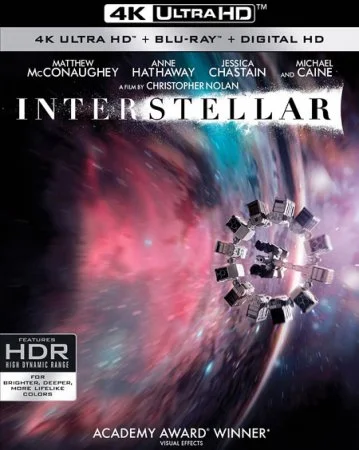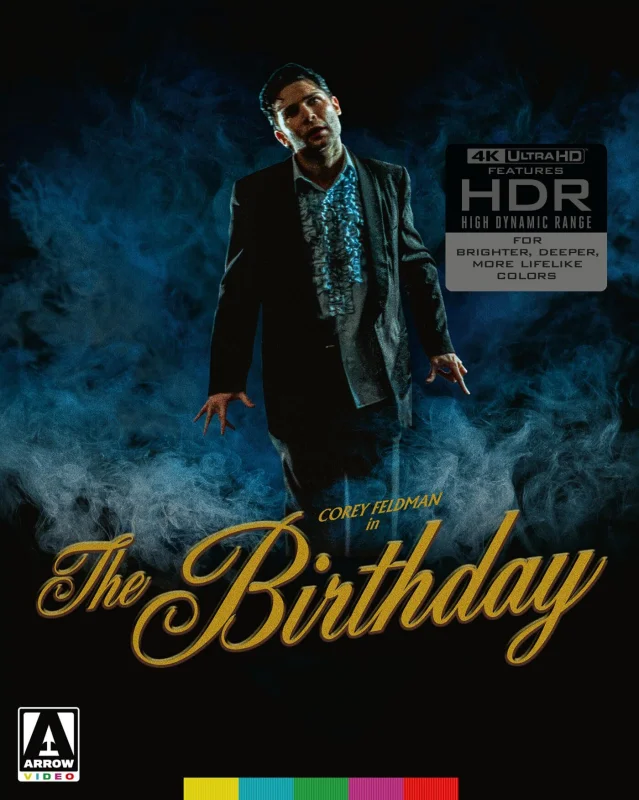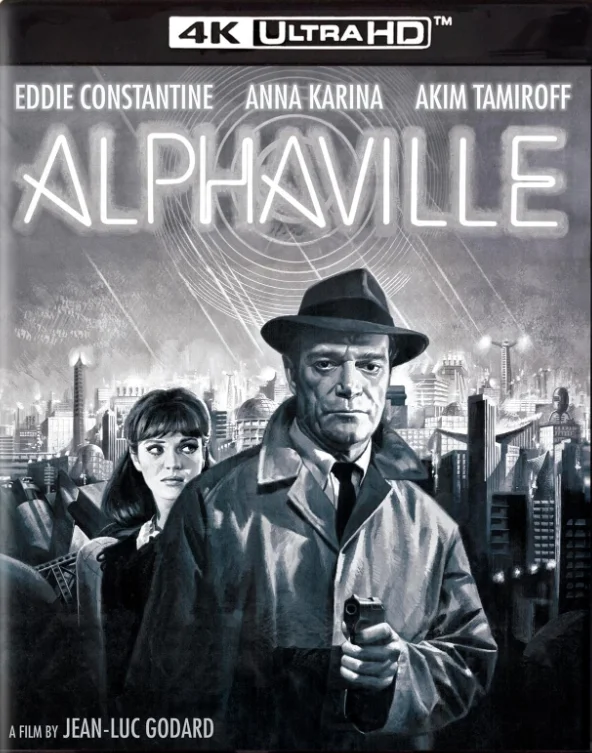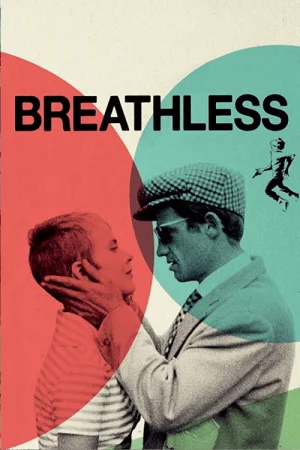Featured Movies
Alphaville: Une étrange aventure de Lemmy Caution 4K 1965 Ultra HD 2160p
Government agent Lemmy Caution (Eddie Constantine) is dispatched on a secret mission to Alphaville, a dystopian metropolis in a distant corner of the galaxy. Caution is hot on the trail of rogue agent Henri Dickson (Akim Tamiroff) and a scientist named Von Braun, the creator of Alpha 60, a computer that uses mind control to rule over residents of Alphaville. Caution is aided in his quest to destroy the despotic computer ruler by Von Braun's own daughter, Natacha (Anna Karina).
User Review
Jean-Luc Godard made more than 50 features over the course of a 60-year career, but 1965’s Alphaville, now being rereleased in a 4K restoration, represented the end of what we might consider his mainstream period. By that point, the director had already revolutionized modern cinema with films like Breathless, Vivre sa Vie, and Contempt. He had also grown beyond the boundaries of the Nouvelle Vague, the movement he had helped launch as both a critic and a filmmaker. By the mid-1960s, he was going through a messy breakup with his star and muse, Anna Karina, the emotional ruin of which would inform his subsequent film, Pierrot le Fou. He had also been flirting with bigger projects like Bonnie and Clyde and I Am Legend, perhaps to go with his growing profile and celebrity.
But Godard had always toyed with genre, making pictures that, for all their experimentation and playfulness, still had — or at least started off with — somewhat familiar plots: gangster movies, war movies, political thrillers, musicals, social-issue dramas. Alphaville, a sci-fi noir featuring a major genre star, was perhaps the pinnacle and culmination of these efforts, the film where Godard felt he adhered most closely to convention. Afterwards, his work would be more freeform, more improvisatory, filled with detours and digressions, rumination and despair. As Richard Brody, in his excellent book Everything Is Cinema: The Working Life of Jean-Luc Godard, puts it, “Alphaville was, in some ways, Godard’s last movie (without, of course, being his last film).”
To watch the picture today is to discover a multilayered and curious prophecy. Godard himself influenced a whole generation of filmmakers with his body of work, but Alphaville specifically helped create a whole genre of interpersonal sci-fi; think of it as the forebear of such later films as Stanley Kubrick’s A Clockwork Orange, John Boorman’s Zardoz, Ridley Scott’s Blade Runner, Wim Wenders’s Until the End of the World, Michael Winterbottom’s Code 46, and dozens of other titles — movies that are as much about the increasingly poisoned bonds between humans as they are about imagining the look of things to come. For all their futuristic gestures, these are movies about their present.
To create his dystopian city of the future, Godard shot in available locations in and around Paris, particularly among the glass and steel structures of the then-new business district of La Défense, as well as the massive new highways and brightly lit tunnels that had cropped up around the city. Godard even eschewed traditional film lights; he and cinematographer Raoul Coutard utilized a newly developed high-speed film stock that would allow them to shoot at night, creating high-contrast images that would give the whole film a stark glow. Everyday items would be transformed into eerie gizmos. For the disorienting close-ups of the film’s all-powerful, artificially intelligent computer Alpha 60, they took a small mechanical fan and lit it from below. (Another idea Kubrick may have borrowed, for the all-seeing red “eye” of HAL 9000 in 2001: A Space Odyssey.) For Alpha 60’s mechanized, stentorian voice, Godard recorded a veteran whose vocal cords had been damaged during the war. This sound is mixed into the film at deafening levels, practically overwhelming the viewer.
Alphaville’s story is basically a cross between a noir and a western. American actor Eddie Constantine had already played his private-eye/secret-agent character, Lemmy Caution, in a series of successful French thrillers. In Godard’s film, Caution arrives in Alphaville posing (half-heartedly) as Ivan Johnson, a journalist for the newspaper Figaro-Pravda, though we soon learn he’s there to neutralize Alphaville’s leader, Professor Von Braun, creator of the aforementioned supercomputer that runs the city. The constant compounding of western and Russian words and names (“Figaro-Pravda,” “Ivan Johnson”) is purposeful, positing that this fascist land of the future isn’t a vision of capitalism or communism, but rather a consumerized, imperial hybrid of both. (Or maybe the two ideas, in Godard’s eyes, were never all that dissimilar.)
As befits a city controlled by artificial intelligence, Alphaville is a place that operates on pure logic, where emotions are forbidden. The language, we’re told, is constantly being updated, and words like love and conscience have been removed. During a surreal execution sequence, one of the condemned is there because he cried at his wife’s funeral. Of course, it’s Godard, so such elements are treated in the most playful manner. The executions occur in a giant swimming pool: Prisoners are machine-gunned, they fall into the water, and they are then stabbed by groups of beautiful synchronized swimmers. Fight scenes are over after a couple of weak punches and some easily broken glass. In other Godard films from the period, such cheeky moments and goofy humor gave the pictures a sense of spontaneity and freedom, marking them as the work of someone whose interests lay beyond a narrative cinema of cheap thrills. Here, however, they add to the unsettling, nightmarish tone; nothing is as it should be.
But beyond all the sci-fi ambitions of Alphaville lies something more personal. Love has been banished from this world, but intimacy and sex have been commodified through the deployment of beautiful, cheerful young women who serve as “seductresses” and greet our hero at every turn. He rejects them in classic tough-guy fashion, but he’s drawn to Karina’s Natacha von Braun, daughter of Alphaville’s founder. An anguished romanticism runs throughout the film, as Lemmy Caution attempts to deprogram Natacha, trying to remind her who she really is and to get her to love again. The final scene features her character struggling out the words “I … love … you.” Is it Godard trying to get Karina to express her love for him again? Or is she a stand-in for him as well, trying to resurrect the adoration they once had for each other?
Either way, it’s the kind of sentimental dénouement that Godard otherwise might have rejected as being strained, simplistic, phony — but here he presents it earnestly, tenderly. Meanwhile, Paul Misraki’s agitated, stabbing score often gives way to brief flights of lyricism; the romantic melody that occasionally drifts across the soundtrack would later show up in Georges Delerue’s famous score for Bernardo Bertolucci’s The Conformist, another film with a clear Alphaville influence.
And all throughout, those brutalist buildings, those banks of lights, those dark, otherworldly streets. Think of how unremarkable such things are in today’s world; almost everything looks like this now. And yet the eerie beauty of Alphaville remains. Every decade or so, Godard’s film is revered all over again for everything it got right about the future. But for all its influence, Alphaville still looks and feels like no other movie. More than a prophecy, it is poetry.
Resolution: Native 4K (2160p)
HDR: Dolby Vision, HDR10
Aspect ratio: 1.33:1
Original aspect ratio: 1.37:1
#English: Dolby Digital 2.0 (Commentary by Film Historian Tim Lucas)
User Review
Jean-Luc Godard made more than 50 features over the course of a 60-year career, but 1965’s Alphaville, now being rereleased in a 4K restoration, represented the end of what we might consider his mainstream period. By that point, the director had already revolutionized modern cinema with films like Breathless, Vivre sa Vie, and Contempt. He had also grown beyond the boundaries of the Nouvelle Vague, the movement he had helped launch as both a critic and a filmmaker. By the mid-1960s, he was going through a messy breakup with his star and muse, Anna Karina, the emotional ruin of which would inform his subsequent film, Pierrot le Fou. He had also been flirting with bigger projects like Bonnie and Clyde and I Am Legend, perhaps to go with his growing profile and celebrity.
But Godard had always toyed with genre, making pictures that, for all their experimentation and playfulness, still had — or at least started off with — somewhat familiar plots: gangster movies, war movies, political thrillers, musicals, social-issue dramas. Alphaville, a sci-fi noir featuring a major genre star, was perhaps the pinnacle and culmination of these efforts, the film where Godard felt he adhered most closely to convention. Afterwards, his work would be more freeform, more improvisatory, filled with detours and digressions, rumination and despair. As Richard Brody, in his excellent book Everything Is Cinema: The Working Life of Jean-Luc Godard, puts it, “Alphaville was, in some ways, Godard’s last movie (without, of course, being his last film).”
To watch the picture today is to discover a multilayered and curious prophecy. Godard himself influenced a whole generation of filmmakers with his body of work, but Alphaville specifically helped create a whole genre of interpersonal sci-fi; think of it as the forebear of such later films as Stanley Kubrick’s A Clockwork Orange, John Boorman’s Zardoz, Ridley Scott’s Blade Runner, Wim Wenders’s Until the End of the World, Michael Winterbottom’s Code 46, and dozens of other titles — movies that are as much about the increasingly poisoned bonds between humans as they are about imagining the look of things to come. For all their futuristic gestures, these are movies about their present.
To create his dystopian city of the future, Godard shot in available locations in and around Paris, particularly among the glass and steel structures of the then-new business district of La Défense, as well as the massive new highways and brightly lit tunnels that had cropped up around the city. Godard even eschewed traditional film lights; he and cinematographer Raoul Coutard utilized a newly developed high-speed film stock that would allow them to shoot at night, creating high-contrast images that would give the whole film a stark glow. Everyday items would be transformed into eerie gizmos. For the disorienting close-ups of the film’s all-powerful, artificially intelligent computer Alpha 60, they took a small mechanical fan and lit it from below. (Another idea Kubrick may have borrowed, for the all-seeing red “eye” of HAL 9000 in 2001: A Space Odyssey.) For Alpha 60’s mechanized, stentorian voice, Godard recorded a veteran whose vocal cords had been damaged during the war. This sound is mixed into the film at deafening levels, practically overwhelming the viewer.
Alphaville’s story is basically a cross between a noir and a western. American actor Eddie Constantine had already played his private-eye/secret-agent character, Lemmy Caution, in a series of successful French thrillers. In Godard’s film, Caution arrives in Alphaville posing (half-heartedly) as Ivan Johnson, a journalist for the newspaper Figaro-Pravda, though we soon learn he’s there to neutralize Alphaville’s leader, Professor Von Braun, creator of the aforementioned supercomputer that runs the city. The constant compounding of western and Russian words and names (“Figaro-Pravda,” “Ivan Johnson”) is purposeful, positing that this fascist land of the future isn’t a vision of capitalism or communism, but rather a consumerized, imperial hybrid of both. (Or maybe the two ideas, in Godard’s eyes, were never all that dissimilar.)
As befits a city controlled by artificial intelligence, Alphaville is a place that operates on pure logic, where emotions are forbidden. The language, we’re told, is constantly being updated, and words like love and conscience have been removed. During a surreal execution sequence, one of the condemned is there because he cried at his wife’s funeral. Of course, it’s Godard, so such elements are treated in the most playful manner. The executions occur in a giant swimming pool: Prisoners are machine-gunned, they fall into the water, and they are then stabbed by groups of beautiful synchronized swimmers. Fight scenes are over after a couple of weak punches and some easily broken glass. In other Godard films from the period, such cheeky moments and goofy humor gave the pictures a sense of spontaneity and freedom, marking them as the work of someone whose interests lay beyond a narrative cinema of cheap thrills. Here, however, they add to the unsettling, nightmarish tone; nothing is as it should be.
But beyond all the sci-fi ambitions of Alphaville lies something more personal. Love has been banished from this world, but intimacy and sex have been commodified through the deployment of beautiful, cheerful young women who serve as “seductresses” and greet our hero at every turn. He rejects them in classic tough-guy fashion, but he’s drawn to Karina’s Natacha von Braun, daughter of Alphaville’s founder. An anguished romanticism runs throughout the film, as Lemmy Caution attempts to deprogram Natacha, trying to remind her who she really is and to get her to love again. The final scene features her character struggling out the words “I … love … you.” Is it Godard trying to get Karina to express her love for him again? Or is she a stand-in for him as well, trying to resurrect the adoration they once had for each other?
Either way, it’s the kind of sentimental dénouement that Godard otherwise might have rejected as being strained, simplistic, phony — but here he presents it earnestly, tenderly. Meanwhile, Paul Misraki’s agitated, stabbing score often gives way to brief flights of lyricism; the romantic melody that occasionally drifts across the soundtrack would later show up in Georges Delerue’s famous score for Bernardo Bertolucci’s The Conformist, another film with a clear Alphaville influence.
And all throughout, those brutalist buildings, those banks of lights, those dark, otherworldly streets. Think of how unremarkable such things are in today’s world; almost everything looks like this now. And yet the eerie beauty of Alphaville remains. Every decade or so, Godard’s film is revered all over again for everything it got right about the future. But for all its influence, Alphaville still looks and feels like no other movie. More than a prophecy, it is poetry.
Info Video
Codec: HEVC / H.265 (89.8 Mb/s)Resolution: Native 4K (2160p)
HDR: Dolby Vision, HDR10
Aspect ratio: 1.33:1
Original aspect ratio: 1.37:1
Info Audio
#French: DTS-HD Master Audio 2.0 Mono (48kHz, 24-bit)#English: Dolby Digital 2.0 (Commentary by Film Historian Tim Lucas)
Info Subtitles
English SDH.File size: 62.95 GB

You have purchased premium on MoonDL or TakeFile. You will automatically be activated an additional 512 GB of traffic every 48 hours or up to 128 GB every 48 hours (Premium Moon).
Watch trailer of the movie Alphaville: Une étrange aventure de Lemmy Caution 4K 1965 Ultra HD 2160p
Maybe You like:
Add comments























 Like
Like Don't Like
Don't Like



